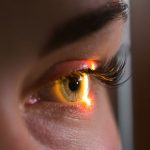Early detection for pterygiums gets the best results
The beautiful South African sun and environment can be extremely harsh on our bodies, including our eyes. People who spend a lot of time outdoors, or exposed to the sunlight, tend to have an increased occurrence of pterygiums.
A pterygium (tuh-RIJ-ee-uhm) is a raised, wedged-shaped bump on the eyeball that starts on the white of the eye and can invade the sensitive cornea covering the iris, the coloured circle. It can be white or cream in colour, and usually grows on the side of the eye closest to the nose. These growths are non-cancerous.
Other risk factors are age (30-50 years old is the most common) and having light-coloured skin or eyes.
You can reduce your chances of developing a pterygium by protecting your eyes from UV light, as well as dusty and windy environments, ie: by wearing UV protective sunglasses, and wide-brimmed hats.
Often there are no symptoms associated with a pterygium, but the area/eye can become gritty, itchy or burning, and it can feel like there is something in the eye. Some days, the affected eye may appear redder and more inflamed. If you are awaiting an appointment or are unable to access medical care immediately, your pharmacist will be able to recommend eye drops to deal with the acute symptoms and so provide relief from the discomfort.
We’d recommend a pterygium be removed sooner rather than later as this is the only way to prevent permanent scarring on the cornea (ie: before it grows to a size that can affect your vision). Whilst an optometrist or general practitioner can confirm the presence of a pterygium, it can only be removed by an ophthalmologist.
If you would like advice about a pterygium or your eyes, please call us 033 812 2020 or email admin@pmbeyehospital.co.za



